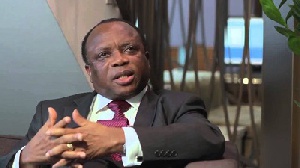 Acting BoG governor, Millison Narh
Acting BoG governor, Millison Narh
Acting Governor of the Bank of Ghana (BoG), Mr Millison Narh has identified effective alignment of monetary and fiscal policy, prudent expenditure regimes and reliance on long-term bonds for infrastructure projects as critical for Ghana to navigate its way through the shocks of falling commodity prices.
He also mentioned the need for deepening public-private partnerships (PPPs), as well as getting the unbanked into the banking system through mobile payment systems as other measures to be pursued to achieve a stable economy.
These, according to him, are the appropriate policy responses needed for the economy to withstand the negative impact of the crashing commodity prices, which experts say is likely to last for a few more years.
Mr Narh spoke to The Finder in Addis Ababa, Ethiopia, where he took part in a roundtable dialogue on monetary and exchange rate policy, debt sustainability amidst global economic slowdown by the Caucus of Central Bank Governors.
The roundtable discussion was part of activities at the ninth Joint Annual Meetings of the African Specialised Technical Committee Meeting of the Ministers of Finance, Monetary Affairs, Economic Planning and Integration and the United Nations Economic Commission for Africa Conference of African Ministers of Finance, Planning and Economic Development at Addis Ababa, Ethiopia.
Ghana lost $3bn in 3 years to commodity price crash
Ghana, which exports cocoa, gold and crude oil, is currently under a three-year International Monetary Fund (IMF) bail-out programme to repair the economy, suffering a high budget deficit, rising public debt and inflation consistently above government targets.
Gold, cocoa and crude oil constitute 80% of Ghana’s exports and, therefore, the price shocks have had a significant effect on the country’s reserves and accelerated volatility in some cases.
Ghana has lost more than $3 billion in revenues as a result of a fall in commodity prices on the world market.
For example, between 2012 and 2015, gold price shocks have led to a loss of more than $2 billion in revenue while shocks in cocoa prices have resulted in more than $1 billion in revenue.
Mr Narh noted that the crashing commodity prices has led to the inability of the country to build enough foreign exchange reserves to serve as buffer to support the local currency from depreciating.
He explained that depreciation of the currency makes imports expensive with its negative impact on consumers.
He stated that the falling commodity prices have negative consequences on current account deficit and trade deficit with far-reaching implications for the economy.
Caucus of Central Bank Governors
The caucus of Central Bank governors noted that if fiscal policies are not aligned with monetary policy, economic indicators would be difficult to achieve.
They were of the view that Finance Ministers who have the responsibility to come up with fiscal policies to address the negative impact of falling commodity prices have failed to do so in many countries.
Consequently, Central Banks are the institutions finding ways to address the negative consequences of the commodities price crash.
Some of the Central Banks were of the view that depreciating of local currencies sometimes are a reflection of deficit in fiscal policy, and allowing such depreciation was necessary for fiscal policymakers to sit up.
According to them, using foreign currency reserves to support during such circumstances would only produce temporary results, and the moment reserves run out, the problem will resurface in a bigger magnitude.
The roundtable discussion noted that the policy directions for monetary and exchange rate policy should be conditioned by exchange rate regime, structure of markets, financial market development and legal framework since the exchange rate is an automatic stabiliser when policy allows.
Issues of efficiency of debt to finance physical infrastructure, open productive areas and diversify economies, strong institutions to develop and protect the markets were also discussed.
Developing bond market for long-term finance to finance infrastructure gap was strongly advocated.
The central bankers stressed that monetary policy alone cannot produce macroeconomic stability because it has its own challenges conditioned by the exchange rate, the available instruments and the type of shocks hitting the economy.
They noted that monetary policy signals and transmission channels in Africa are weak and therefore requires financial development.